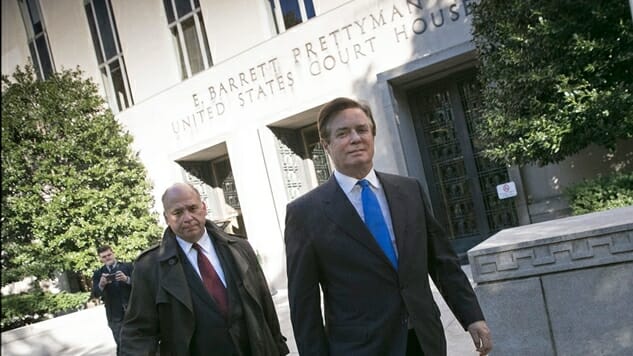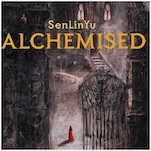This Is the Strangest Part of Yesterday’s Indictments of Paul Manafort, Rick Gates and George Papadopoulos
Photo by Win McNamee/Getty
After reading through yesterday’s shocking indictment of Paul Manafort, and the even more shocking and surprising announcement of a three-month-old indictment of George Papadopoulos, one detail jumped off the Department of Justice’s document that is so astoundingly strange, I must devote an entire column to it.
I’m not trying to pull a Louise Mensch here, and tell you how in 47 steps, the Grand Wizard of the Supreme Court will actually behead Donald Trump on next week’s Dancing With the Stars—nor am I pulling a Seth Abramson, and misreading an official document while repeatedly stating the obvious before basing a conclusion off of facts that I invented. I am simply befuddled, and I need help wrapping my brain around what the hell went down between George Papadopoulos and a “Professor” now revealed to be Joseph Mifsud.
Per the United States Department of Justice:
On or about March 14, 2016, while traveling in Italy, defendant PAPADOPOULOS met an individual who was a professor based in London (the “Professor”). Initially, the Professor seemed uninterested in defendant PAPADOPOULOS. However, after defendant PAPADOPOULOS informed the Professor about his joining the [Trump] Campaign, the Professor appeared to take great interest in defendant PAPADOPOULOS. Defendant PAPADOPOULOS was interested in the Professor because, among other reasons, the Professor claimed to have substantial connections with Russian government officials, which defendant PAPADOPOULOS thought could increase his importance as a policy adviser to the Campaign.
George Papadopoulos was one of the first five foreign policy advisers named by the Trump campaign. There’s no denying this—Trump read their names off to The Washington Post. Our old pal/habitual liar/FISA target/dumbest man to ever own a PhD—Carter Page—was one of the five as well. The high-quality talent that Trump attracts is just breathtaking.
Anyway, back to our pals the Professor and Papadopoulos, and the insane story that is legally affirmed to be true by both Papadopoulos and the DOJ. Here is where my confusion lies:
What makes Papadopoulos guilty is lying about contacts he had with the Professor (among others, as well as obstructing justice by deleting his Facebook page containing conversations with Kremlin associates). This stands to reason that the Professor was under some sort of surveillance thanks to potential links to the Kremlin, and this knowledge is how the Feds were able to extract Papadopoulos’ e-mails in order to prove his testimony to be false. You can’t just grab them, so I read this thinking the Professor was one of the Kremlin’s contacts in London.
So of course, at first glance, the Kremlin reaching out to the Trump campaign is nothing new. In fact, that’s the norm of the 2016 campaign. However, at first glance, Papadopoulos did not reveal himself to be of use to the Kremlin. The DOJ document clearly states that “Initially, the Professor seemed uninterested in defendant PAPADOPOULOS.” It took the impending Trump foreign policy adviser’s admission to gain the Professor’s attention. While traveling. In Italy. How the hell did this happen?
Was Papadopoulos on vacation, drunkenly telling everyone within earshot that he was a Trump adviser?
Did they randomly strike up a conversation on a tourist boat in Venice?
Was the Kremlin monitoring people the Trump camp was meeting with, looking for an insertion point?
Was Papadopoulos following the Professor? (since the document says he was interested in him due to his Kremlin contacts)
Maybe the Professor was always interested in Papadopoulos, and the “seemed uninterested” is simply Papadopoulos’s misreading of the situation?
Seriously, how did this happen? How did a Kremlin-connected Professor living in London meet a Trump adviser from Illinois when they were both in Italy? This is a lot of happenstance to just simply accept as fact without some logic underlying it.
The reason this causes me such consternation is that this relationship between Papadopoulos and the Professor leads to a litany of other people that Papadopoulos lied to the Feds about. Without it, none of this seems like it could ever happen. The Professor introduced him to a man connected to the Russian MFA (Ministry of Foreign Affairs), who raises some of the most harrowing connections in this explosive 14-page document that I sincerely urge you to read. This document is proof of an intention to collude. The only question is whether/how much Trump is connected to it, and according to CNN, this email in the DOJ document is between Paul Manafort and Rick Gates:
”We need someone to communicate DT is not doing these trips. It should be someone low level in the campaign so as not to send any signal.”
It wouldn’t be new for the Russians—or any intelligence community from any country—to develop an asset inside of a political campaign. What makes this very small portion of another “small part of a large-scale investigation” so mystifying is how important it is to the narrative of the entire DOJ document, and how random their meeting seems to be when taking the document at face value. If the Professor was unaware of Papadopoulos’ Trump connections before he opened his mouth, could this whole thing have been busted open on plain old dumb luck? It seems impossibly random that a relationship between two key people could have genuinely and randomly sprung to life in a place where neither of them lived. It seems far more likely that the one sentence which sums up their chance meeting in Italy has countless pages of documents underlying it, and we only have a very thin slice of the official story.
The U.S. intelligence community agrees that Russia intervened in the 2016 election to hurt Hillary Clinton. The hysteria around this entire Mueller investigation surrounds whether the Trump camp accepted that help. Given the “I love it!” Trump Jr. response to theoretical help from “the Crown Prosecutor of Russia,” Trump saying he would have taken that meeting with the Kremlin lawyer, a WSJ report of a Republican operative who told people that he worked for Michael Flynn and knowingly reached out to Kremlin-connected hackers to obtain Hillary’s e-mails, that at least 40% of their initial foreign policy advisers were looking for help from people they knew to be involved with the Russian government (Page and Papadopoulos), and Trump’s refusal to say anything negative about Vladimir Putin, it seems far more likely that the Trump camp did accept help than didn’t—even though we don’t have any concrete evidence confirming they did (yet).
Only time will tell, and the relationship between Papadopoulos and the Professor likely provides an enlightening window into the seriousness of that effort. At the very least, given the following passage from this DOJ report, it’s hard to see how President Trump wasn’t aware of Papadopoulos’s efforts to set up a meeting with the Kremlin.
On or about March 31, 2016, defendant PAPADOPOULOS attended a “national security meeting” in Washington D.C., with then-candidate Trump and other foreign policy advisors for the Campaign. When defendant PAPADOPOULOS introduced himself to the group, he stated, in sum and substance, that he had connections that could help arrange a meeting between then-candidate Trump and President Putin.
Jacob Weindling is a staff writer for Paste politics. Follow him on Twitter at @Jakeweindling.







































